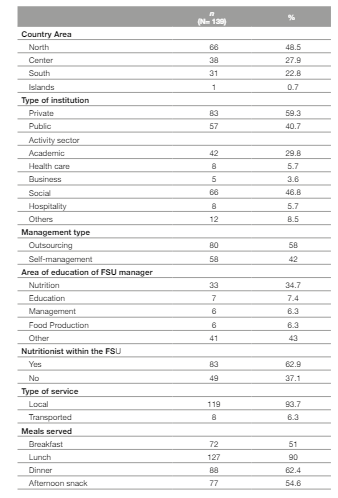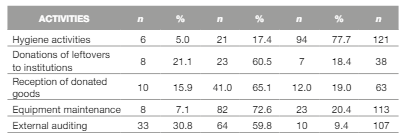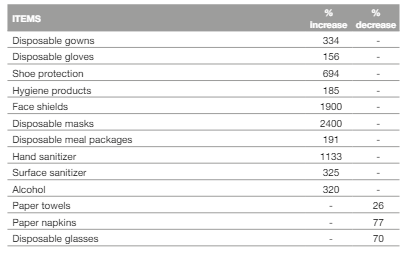INTRODUCTION
One of the greatest challenges of the 21st century is to comply with a growing world population, considering the planet's limited resources. To meet current and future food needs, it is necessary not only to increase food production but also to improve food management, since one-third of the food produced is wasted throughout the food supply chain, while many people are still starving (1, 2). Aiming at sustainable development at a global level, in 2015, the United Nations General Assembly established 17 goals to be achieved by 2030 by all member states, which include the elimination of poverty and hunger, the reduction of inequalities and responsible production and consumption (3). Framed within this "sustainable development" policy, it is urgent to adopt practices that do not cause irreversible damage to the ecosystem and that do not compromise the survival of future generations (4, 5).
Considering the growing trend of food consumption outside the home, Food Service units (FSU) achieved importance and responsibility in feeding the population (6). In addition to its socio-economic impact, the Food Service industry has a strong environmental impact (6-9). The large-scale production of meals implies a high use of resources, such as water, energy, materials, and equipment (7, 8). Water is used for cleaning and sanitization, both of food, facilities, and cooking tools and appliances, as well as for the preparation of various culinary preparations (7). Energy is essential for equipment operation, the lighting of workspaces and the preservation of food and meals, namely maintenance of the cold chain and/or of the distribution temperature (7). As an aggravating factor, waste is generated throughout the various steps of food production, including selection, preparation, distribution, and consumption (leftovers and plate waste) (7, 8). The Food Service Business is responsible for around 26% of the total food waste, corresponding to 244 million tonnes, with economic costs and environmental (use of resources and emission of greenhouse gases) consequences (10, 11).
In recent years, there has been a growing concern regarding sustainability. In the Food Service area, several recommendations were produced to make the production of meals more sustainable, particularly towards a greater concern with maintenance and energy efficiency of equipment, use of reusable material, purchase of local products, less use of processed and packaged goods, proper selection and disposal of solid waste and use of strategies to avoid food waste (12-15). Although research shows that this industry is still below the desired level, there has been, growing recognition of the relevance of this issue and an effort by food service units to comply with sustainability guidelines (8, 9, 16-20). However, at the end of 2019, with the emergence of the Covid-19 pandemic, this effort was affected by the contingency measures imposed to stop the spread of the virus. Covid-19 is an infectious disease caused by SARS-CoV-2, which was first identified on 31 December 2019 in Wuhan, China. On March 2nd, 2020, the first case of infection was identified in Portugal, and a State of National Emergency was decreed under the terms of the Presidential Decree nº14-A/2020 of March 18, which was subsequently renewed. On the 11th of the same month, the disease had already been declared a pandemic by the World Health Organisation (21). According to the current scientific evidence, contamination by coronavirus happens by direct contact with an infected person or by indirect contact through surfaces or objects, where it can remain for at least 48 hours (22). Thus, preventive measures focus on social distancing, rules of respiratory etiquette, personal hygiene and hygiene of facilities and equipment. Some of the recommendations of the Directorate-General for Health consist of frequent hand hygiene using paper towels for drying, frequent sanitation of surfaces and equipment with single-use and disposable cleaning material and use of disposable personal protective equipment (masks, gloves, gowns and others) (22).
In the specific context of the FSU, the provision of cutlery and paper napkins in individual bags, the use of disposable paper towels, the supply of individual portions of bread and spices, as well as bottled water, were recommended (23). These measures are, in many cases, a setback and an obstacle to the implementation of more sustainable practices, some of which may be associated with a higher risk of contamination. On the other hand, they imply greater consumption of natural resources and materials, which entail environmental and economic costs (3).
Thus, the present study aimed to assess the impact of the implementation of the contingency measures for the Covid-19 pandemic on the environmental practices of food services throughout the Portuguese territory.
METHODOLOGY
Target Population and Sample
This study was aimed at all public and private food service units in Portugal. The sample was obtained by convenience, contacting food service companies, private institutions of social solidarity, municipalities, professional associations, social action services and colleagues active in this sector. These contacts were made through email, after compiling a database on these institutions in Portugal.
Data Collection Instrument
A questionnaire was developed, consisting of multiple choice and open questions, divided into two parts: a) characterization of the Food Service unit (14 items); b) impact of the implementation of contingency measures for the Covid-19 pandemic (35 items). Participants were fully informed of the objective of the study and consented to participate. The questionnaire was distributed through an online link sent by email.
Data Analysis
Statistical analysis was performed using R software version 4.0.3 considering a 5% significant level. The exploratory analysis included the calculation of mean, standard deviation, median, percentiles, percentages, and plots. The differences between meals served before and after the pandemic were calculated using the Mann-Whitney test, after analysis of variables normality.
This study was approved by the Ethical Committee of the Faculty of Food Science and Nutrition of the University of Porto. By the General Regulation on Data Protection (RGPD), the data collected is confidential and anonymous and, will be stored for a maximum period of 5 years, after which it will be deleted.
RESULTS
The sample is mostly from the North of the country similarly distributed between the Centre (27.9%) and the South (22.8%). Most of the respondents are from the private sector (59.3%), outsourced, and manly from social institutions (46.8%) followed by the academic sector (29.8%). The majority of the FSU have a nutritionist (62%), and in around half (34.7%) this is the FSU manager. The predominant type of service is cook and serve and lunch is the most produced meal (Table 1).
Table 2 shows a decrease in the number of meals served. A significant difference was found for all types of meals (p<0.05). Lunch is the meal where this decrease was higher, especially in the academic and business sectors (Table 3), since due to the pandemic, some FSU were temporarily closed.
There was a big increase in the frequency of hygiene activities on the other hand external auditing was the activity that suffered a higher impact with a decrease of 31.1%. Maintenance of equipment was the least affected activity (Table 4).
The use of disposable items, such as plates, paper towels, bags, packages and tray towels was adopted by 47.5% of FSU, as well as individual packaging for cutlery, bread and fruit (Table 5). Other items, such as soup, main course, salad and desserts were also provided individually packed. There was a big increase in the use of individual protective equipment and hygiene products, especially face shields (1900%), disposable masks (2400%) and hand sanitiser (1133%). These results are highlighted in Table 6.
DISCUSSION OF THE RESULTS
In the last decades, the food service sector has been growing and evolving, adopting measures and good practices to reduce food waste and increase sustainability (24). The COVID-19 pandemic determined profound changes that affected individual and social behaviour. One of the main consequences of confinement was the reduction of the number of meals served, affecting mostly the private business sector and schools, when compared to the social and healthcare sectors. This fact caused an increase in homemade and/or takeaway meals, the last option impacting the number of packages and disposable items (25). Additionally, several economic and social consequences were observed due to the loss of consumers in the food service sector. The observed increase in unemployment and layoff determined higher levels of food insecurity affecting the three pillars of sustainability. In Portugal, the food service and hospitality sectors were most affected - 36% of the companies were temporarily closed and 2% were permanently closed (26). The company's turnover was also reduced by 96% (26). A study developed in Romania revealed a less severe impact with only 7.14% of restaurants closed during the lockdown and 53.57% restricting activity and operating based on online orders and 39.29% operating exclusively on online orders (27). The pandemic's social and economic impact is one of the well-known effects, compromising families' access to food and healthcare (28, 29).
Despite some of these changes that may have positive outcomes, namely traffic reduction, travelling, and industrial activity followed by less consumption and pollution, the Portuguese Health Directorate enforced some recommendations with a severe impact on sustainabilityn (30). Some of these measures were related to the use of face masks, gloves, protective gowns, and face shields. As stated in our study, the use of disposable face masks increased by 2400%, face shields by 1900% times, disposable gowns by 334% and gloves by 156%. There was also a 694% increase in shoe protection, 1133% in hand sanitiser and 325% in surfaces sanitiser and 320% in alcohol. These results indicate that despite several safety procedures were already implemented in the food service sector, significant increases were observed, due to the adoption of additional measures and/or increased frequency causing more use of disposable items. Several authors have highlighted the impact of individual protective equipment, namely face masks, gloves and disinfectant use on waste and the environment (31, 32), face masks being the most improperly disposed of item (33). The authors refer that both the plastic waste from households and increased biomedical waste impact the environment and compromise human health in the future (31).
Other measures determined by the Portuguese Health Directorate referred to the mandatory cleaning of tables, chairs and food trays after each use. This may explain the increased use of hygiene products (185%) as well as the increase in hygiene activities (78%). Researchers from Romania also reported sanitary changes imposed by law (27). The hygiene procedures are relevant for consumers to feel secure while continuing to consume meals from restaurants during the pandemic (34-36). Other researchers have found that the hygiene practices implemented during the pandemic, increase the employees' perception and behaviour frequency of these procedures, namely hand washing and cleaning and disinfecting of kitchen items (37). Reinforcement of safety procedures during the Covid-19 pandemic also highlighted and strengthened the already implemented food safety procedures in the food service business (36).
Nevertheless, a decrease in paper towels (26%) and napkins (77%), as well as disposable glasses (70%), was observed, which is most likely related to the decrease in the number of meals served.
Subsequent recommendations from the Health Directorate on the measures were the use of individual packages as observed in our study the main increase was observed in cutlery (49%) followed by bread, fruit and water. The impact of plastics on the environment is well known and studied (38) and there has been an effort to change towards paper or other materials for packaging. In Portugal, after transposing a European Directive, this recommendation has become mandatory by law (39). Nevertheless, researchers have studied the impact of these new materials, stating that although they represent an alternative, argue whether a change is enough, or if consumption of these types of single-use items should be eliminated (40). If reducing this usage was a need and a reality before the pandemic, these recommendations for individual packaging after the pandemic may have greatly increased environmental impact.
LIMITATIONS
The main limitation of this study is the fact that maybe due to the extent of the questionnaire, and despite many reinforces in dissemination, it was not possible to retrieve a representative sample, coupled with a low response rate, especially in the last questions that refer to the volume expenditure on disposable items. Due to lack of data, it was not possible to calculate the increase or reduction of hygiene activities and disposable items associated with the number of meals served, which is also a limitation, once they are related. Nevertheless, there was a global decrease in meals served with a high percentage of units where hygiene activities and the use of disposable items were maintained or increased.
CONCLUSIONS
In the last decades, a remarkable effort of the food service sector was observed to comply with sustainable development goals, aiming to achieve a more sustainable process, namely by the use of more efficient equipment, use of recyclable items, acquisition of local, low processed and packaged products, control of food waste and strict control of residues destination. This study observed a great impact on the implementation of the contingency measures for the COVID-19 pandemic. The observed changes, highlighted by this study raise concerns about the need to keep these measures, some of them were adopted due to fear of the unknown, and its consequences on an ongoing successful process, that took a severe setback. Policymakers should evaluate the adopted practices that are still in place and keep the ones that may prove to be efficient and positive and abandon or relieve the unnecessary ones. Other measures such as hygiene procedures, should be kept to ensure food and environment safety and consumer confidence in food service establishments.
FUNDING
This work was supported by FCT/MCTES (UIDB/05608/2020, UIDP/05608/2020, UIDB/05748/2020 e UIDP/05748/2020 and GreenUPorto ‐ Sustainable Agrifood Production Research Centre/Inov4Agro.





















